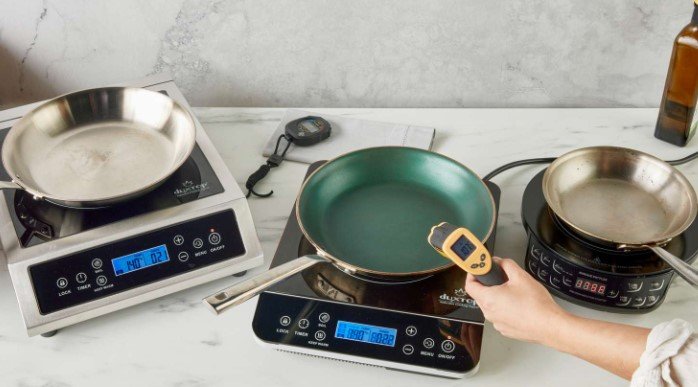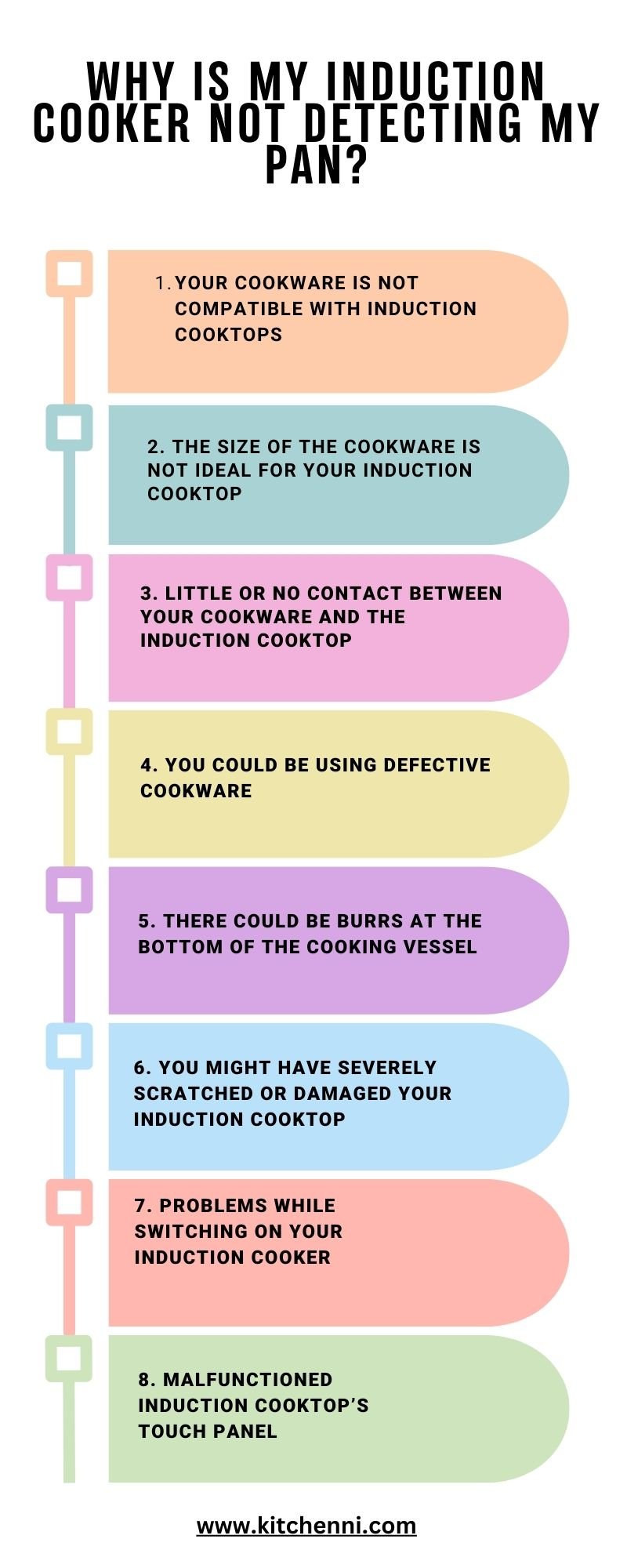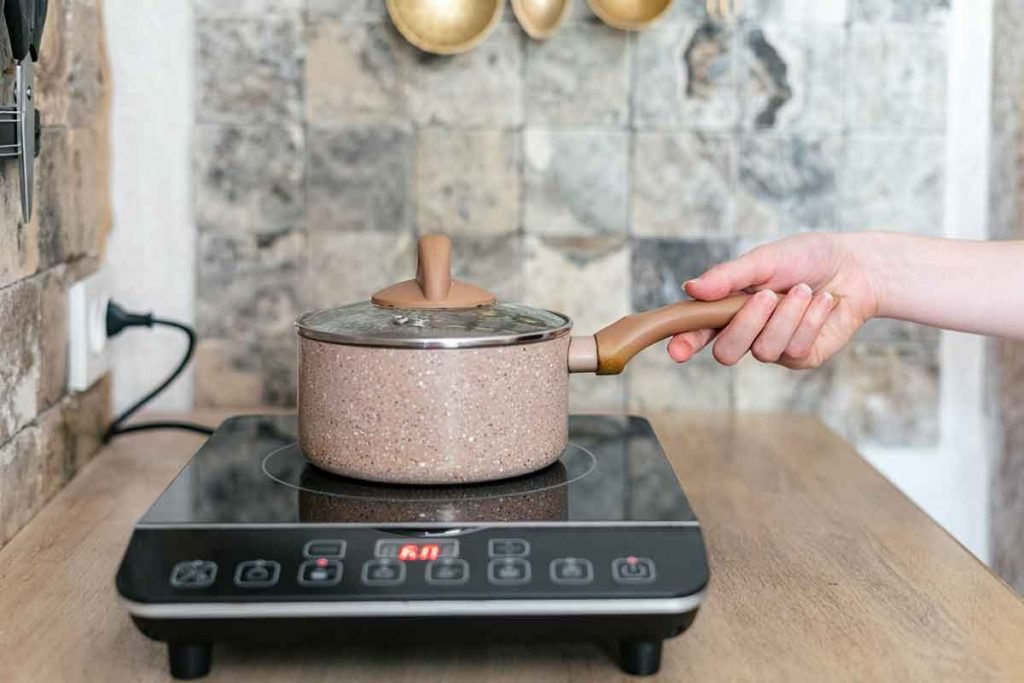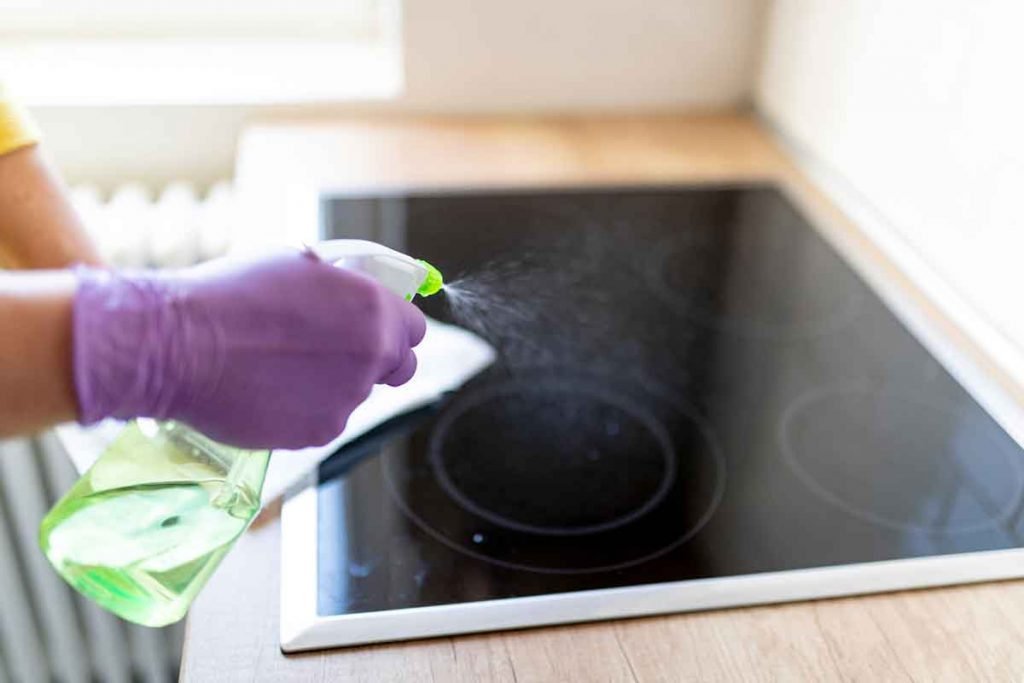- Simple to use
- Ideal for a broad variety of cookware
- They allow you to use non-induction pans on your induction cooktop.
- Available in different sizes
- Durable and long-lasting
Other Induction Cooktop Problems
I’ve seen induction cooktop owners struggle with a ton of issues. Here are some of them.
1. Problems While Switching on Your Induction Cooker
Your induction cooker may fail to switch on due to complicated electrical installation in your kitchen, damaged induction hob, out-of-shape power board, or poorly connected terminal block. This could also mean that your voltage is not correctly distributed. Alternatively, there could be a power outage in your place. Check out these factors and seek assistance.
2. Your Cooktop May Shut off While Cooking
This may not necessarily mean that there is something wrong with your induction cooktop. Modern cooktops have an automatic shut-off feature as an advanced safety feature. Such cooktops automatically shut themselves off when they detect that your cooking has exceeded the maximum cooking time.
They might also shut off when the ventilation unit is compromised. Heat could be building up, thus causing a high internal temperature. The automatic shut-off could also mean that your cookware is not placed correctly on the cooktop. Don’t hesitate to contact your service provider when this happens, and you’re not sure of what to do.
3. Malfunctioned Induction Cooktop’s Touch Panel
Your cooktop’s touch panel may malfunction due to overheating, insufficient mains voltage, interrupted module communication, or poor connection between the power module and the processor.
4. Disturbing Noise from Your Cooktop
You’re likely to hear different weird noises when using your induction cooktop. Although the noises could be distracting, they are an excellent way to alert you that your cooktop functions properly or something is amiss.
For instance, the fan noise is normal and is required to cool down your induction unit. On the other hand, a cracking noise while cooking would mean that the cookware you are using is not 100% ideal for induction use. A humming sound, especially when the cooktop is not in use, could mean that it is important for you to activate your lock feature
5. Your Display Keeps on Flashing
Your display could keep on flashing to indicate that the pan you are using is not of the right size or right material, or that you have not placed your pan well in the cooking area. Check out for the above factors and observe whether the light will finally shut down. If the flashing is still persistent, reboot your unit (power off and on) as you await professional assistance.
Here’s a Tip
When choosing an electrician, consider one that will prioritize your time and safety and offer quality services. A good reputation and several years of experience would mean that your electrician is good at their job and will probably treat your home with respect.
As you can see, a variety of problems are likely to occur when using your Induction cooktop. We hope that our easy-to-implement guide will help you solve the different challenges you may encounter when using your unit! If you have any questions or would like to learn more about induction cooktops, be sure to visit our blog.
Common Questions
What pan material works with induction cooktops?
Induction requires cookware with a magnetic base like cast iron or stainless steel. Copper, aluminum, glass, and ceramic won’t work unless specially designed for induction.
Why does my induction cooker keep turning off?
Frequent auto shut-off is typically caused by using incompatible cookware, undersized pans, warped pan bottoms not making sufficient contact, or defective coils preventing detection.
Should an induction cooker make noise when detecting a pan?
Some clicking or faint humming is normal when it detects a pan. Loud or continuous rattling/buzzing noises typically mean an issue needs troubleshooting.
The global induction cooktop market size is expected to grow at over 5% annually through 2027. These cooktops have indeed improved cooking experiences. This is evidenced by their popularity, both at home and in professional environments. The cooktops are very responsive in heating and easy to clean, making them incomparable to gas and electric cooktops.
Induction units also offer precise heating and low cooking risk. These unmatched benefits have seen the sale of these appliances improve drastically. However, despite the sophistication, a few induction cooktop users have raised concerns about the errors they encounter when using Induction cooktop units. Read on as we discuss different errors you may encounter when using your Induction cooker.
Why is My Induction Cooker Not Detecting My Pan?
Here are a few reasons why:
Why is My Induction Cooker Not Detecting My Pan infographic
1. Your Cookware is Not Compatible With Induction Cooktops
There is a high possibility that your pan is not an induction-ready pan. Induction cooktops only cook food or boil water if the cookware used is compatible with them. In other words, it is only pans and cooking utensils that contain ferrous metal in the base that will work on your Induction cooktop. You can confirm whether your cookware is induction compatible with the note that is normally stuck at the base of your cookware.
2. The Size of the Cookware is Not Ideal for Your Induction Cooktop
We have already mentioned that your cookware needs to be Induction-ready to use on your induction unit. But does the size of the cookware matter? Yes, it does. It is important to note that the size of your cookware matters when it comes to induction cooking.
Your cooktop’s effectiveness is directly related to the size of your cookware. The diameter of the cooking vessel you are using should be the same as the induction hob’s diameter. If the cookware is too big, some of its zones will be outside the hob, and your pot will not heat properly. On the other hand, small-based cookware may fail to activate the induction unit.
3. Little or no Contact Between Your Cookware and the Induction Cooktop
Induction cooktops don’t pass current when they are not in good contact with the pan. Always ensure that your cooktop is flat and thick enough to allow heat transfer from the induction unit. Keep off thin or light cookware. This cookware tends to lose shape when exposed to high induction temperatures. Choosing this cookware will not only destroy them but adversely damage your cooktop.
4. You Could Be Using Defective Cookware
The other reason why your induction cooktop may fail to detect your pan is due to electromagnetic interference. Your cookware may be compromised in terms of shape, thickness, or even magnetic strength. This means that the magnetism in your cookware may not be strong enough to handle heat transfer from the induction unit.
5. There Could Be Burrs at the Bottom of the Cooking Vessel
The state of your cookware may affect the rate at which your induction unit passes heat. Dirt, intense scratches, and burrs at the bottom of your cookware could be the reason why the induction unit fails to detect your pan.
6. You Might have Severely Scratched or Damaged Your Induction Cooktop
Although they are easy to clean, induction cooktops can be very delicate and sensitive to abrasion. This is why you should never use abrasive sponges, steel wool, salt, and some detergents to clean your induction cooktop. The extensive damage these products do to the induction cooktop might make it fail to work. As an alternative, use ceramic-friendly cleaning products and only do so after your cooktop is adequately cooled off.
Can any Pan be Used on the Induction Cooker?

There are only four materials that are guaranteed to work with the induction cooktop. These materials are graniteware, cast iron, enameled cast iron, and magnetized stainless steel. It is advisable to refrain from using aluminum, glass, or plastic cookware on your induction cooktop as they would not work.
Induction Cooker Pan Detection Test
The best way to test whether your cookware is induction compatible is by using a kitchen magnet. Simply pass a magnet to the bottom of your cookware. If the magnet clings to the underside of your cookware, then the cookware is ideal for induction cooktop use.
In case the magnet grabs the pan softly but then falls, this means that the cookware would not perform well in your induction cooktop. A complete lack of magnetic pull between your cookware and the magnet would mean that the cookware does not contain the right metals for induction cooktop use.
How to Trick an Induction Cooker
What is an induction converter and what options are available in the market?
An induction hob converter is a disc-like pan that creates a magnetic field once placed on an induction unit. The disc uses the heat created by the induction unit to heat your food.
The benefits of using an induction hob converter are:
- Simple to use
- Ideal for a broad variety of cookware
- They allow you to use non-induction pans on your induction cooktop.
- Available in different sizes
- Durable and long-lasting
Other Induction Cooktop Problems
I’ve seen induction cooktop owners struggle with a ton of issues. Here are some of them.
1. Problems While Switching on Your Induction Cooker
Your induction cooker may fail to switch on due to complicated electrical installation in your kitchen, damaged induction hob, out-of-shape power board, or poorly connected terminal block. This could also mean that your voltage is not correctly distributed. Alternatively, there could be a power outage in your place. Check out these factors and seek assistance.
2. Your Cooktop May Shut off While Cooking
This may not necessarily mean that there is something wrong with your induction cooktop. Modern cooktops have an automatic shut-off feature as an advanced safety feature. Such cooktops automatically shut themselves off when they detect that your cooking has exceeded the maximum cooking time.
They might also shut off when the ventilation unit is compromised. Heat could be building up, thus causing a high internal temperature. The automatic shut-off could also mean that your cookware is not placed correctly on the cooktop. Don’t hesitate to contact your service provider when this happens, and you’re not sure of what to do.
3. Malfunctioned Induction Cooktop’s Touch Panel
Your cooktop’s touch panel may malfunction due to overheating, insufficient mains voltage, interrupted module communication, or poor connection between the power module and the processor.
4. Disturbing Noise from Your Cooktop
You’re likely to hear different weird noises when using your induction cooktop. Although the noises could be distracting, they are an excellent way to alert you that your cooktop functions properly or something is amiss.
For instance, the fan noise is normal and is required to cool down your induction unit. On the other hand, a cracking noise while cooking would mean that the cookware you are using is not 100% ideal for induction use. A humming sound, especially when the cooktop is not in use, could mean that it is important for you to activate your lock feature
5. Your Display Keeps on Flashing
Your display could keep on flashing to indicate that the pan you are using is not of the right size or right material, or that you have not placed your pan well in the cooking area. Check out for the above factors and observe whether the light will finally shut down. If the flashing is still persistent, reboot your unit (power off and on) as you await professional assistance.
Here’s a Tip
When choosing an electrician, consider one that will prioritize your time and safety and offer quality services. A good reputation and several years of experience would mean that your electrician is good at their job and will probably treat your home with respect.
As you can see, a variety of problems are likely to occur when using your Induction cooktop. We hope that our easy-to-implement guide will help you solve the different challenges you may encounter when using your unit! If you have any questions or would like to learn more about induction cooktops, be sure to visit our blog.
Common Questions
What pan material works with induction cooktops?
Induction requires cookware with a magnetic base like cast iron or stainless steel. Copper, aluminum, glass, and ceramic won’t work unless specially designed for induction.
Why does my induction cooker keep turning off?
Frequent auto shut-off is typically caused by using incompatible cookware, undersized pans, warped pan bottoms not making sufficient contact, or defective coils preventing detection.
Should an induction cooker make noise when detecting a pan?
Some clicking or faint humming is normal when it detects a pan. Loud or continuous rattling/buzzing noises typically mean an issue needs troubleshooting.




